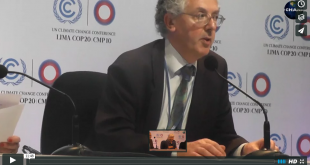Climate Action Tracker is an independent science-based assessment consortium, tracking all countries‘ emission reduction pledges (Paris Agreement) and their implementation, with CAT assessments being regarded as the thermometer of international climate action ambition. The Climate Action Tracker Consortium with Dr (h.c.) Bill Hare and Prof. Dr Niklas Höhne, present an updated report on how the countries who committed to reducing emissions are progressing in terms of reaching their Paris Agreement temperature goals, at COP 22 in Marrakech
Prof. Dr Niklas Höhne (New Climate – Founder and Director), explained that the assessments are substantial as they are individual analyses of each of the 25 signed up countries updates. An important element to note was that the Paris agreement INDC’s (Intended Nationally Determined Contributions) at that point were not sufficient or compatible with the long term goals, and countries have now been requested to ratify their agreement and at the first opportunity to increase the ambition of their INDC’s, normally at the moment of ratification. Unfortunately, only 2 countries out of 25 actually increased their INDC ambition, being Morocco and Nepal, both of whom have been rated by CAT as two of the smaller countries whose actions in this regard are doing something sufficient in terms of limiting global climate change, compatible with the long term goals.
If INDC’s are not changed through ratification, then countries should at least change their national policy in order to implement the INDC’s, a longer process. There have been a few movements on a global scale, with the projected outcome in terms of the temperature estimate of 3.6 degrees at the end of the century, if countries continue with their currently implemented policies path, would be the same as a year ago.
USA – The Obama administration has put forward a Climate Action Plan which they implemented step by step, an important step of this was the “Clean Power Plan” which was implemented, but subsequent steps not as yet, however, currently implemented policies on power mean that emission levels would remain stable. With Trump announcing that he will not be implementing any additional climate policies, pre elections, or worse he could decide to reverse the “Clean Power Plan”, if so, the USA will not meet it’s INDC’s, which would require significant reductions until 2025.
On global terms, the most important country in terms of climate change is China, with some very encouraging developments who have, inter alia, decreased their coal consumption for 3 consecutive years, supporting and increasing renewable energy technologies quite significantly and zero emission vehicles, i.e. electric cars, a very important prerequisite for decarbonisation globally with quota considerations for newly registered vehicles to be electric. We, (CAT) estimate that they are on track of peaking emissions by 2025/30 which is part of their NDC’s, however, there are additional emissions other than GHG’s, and if one looks at all of the emissions, then China is still giving off significant emissions which will continue until 2030. With Trump’s election as president, the position of the global climate leader is open right now and China’s successes in reducing coal, increasing renewables and pushing electric mobility, it becomes conceivable that China is in line to become the global leader in climate change, which could change the political dynamics significantly.
India, given its development state, an escalation in emissions from coal-fired powered plants would have been expected, for decades, instead there is a transition under way towards more renewables, increasing energy efficiency, tax on coal policy, including starting to displace plans for coal-fired power plants, a very positive and surprising development. So projections are that India will overachieve its INDC, with very real transitions underway in the country.
In closing, Dr Hare gives and overview of the EU situation, commenting that historically, the EU have been the leader, both internationally and domestically on climate change, however, in recent times its level of action has begun to slow down amidst debates on their performance levels, etc. however, with the present turbulence in the international climate policy arena, suggests that with the election of Trump as USA president, it should be an opportunity for the EU to reinvigorate it leadership and accelerate its climate change policies in order to implement their goals, as this would have long-term benefits.
Question from the floor (Press) : ‘To close the emissions gap, renewed political commitments are required’…this raises a question as to whether the current economic business momentum is going to be enough to carry the process forward if that political process stalls ~ a real possibility?
Response by Dr Hare, quote: ‘I am optimistic that as leaders get together and assess what is going on, look at all the other geopolitical changes that will happen, they will come back at that, more ambitious and move it forward’, unquote.
Links:
http://www.climateactiontracker.org/
[Climate Action Tracker is a Nonprofit climate science and policy institute with headquarters based in Berlin, which brings together interdisciplinary expertise in the scientific and policy aspects of climate change, being a Consortium of three organizations, i.e. New Climate, Eco Fierce and Climate Analytics]
http://climateanalytics.org/about-us/team/bill-hare.html (Co-founder – Dr (h.c) Bill Hare – (CEO/MD and Senior Scientist)
https://newclimate.org/ (Prof. Dr. Niklas Höhne (Founder and Director)
http://www.wri.org/indc-definition (What is an INDC and the process?)
http://climateanalytics.org/files/1p5_limit_vs_2016_temp_anomalies.pdf (The 1.5℃ temperature limit in the Paris Agreement and 2016 temperature records.)
 Mother Channel Environmental, climate change news and media.
Mother Channel Environmental, climate change news and media.



